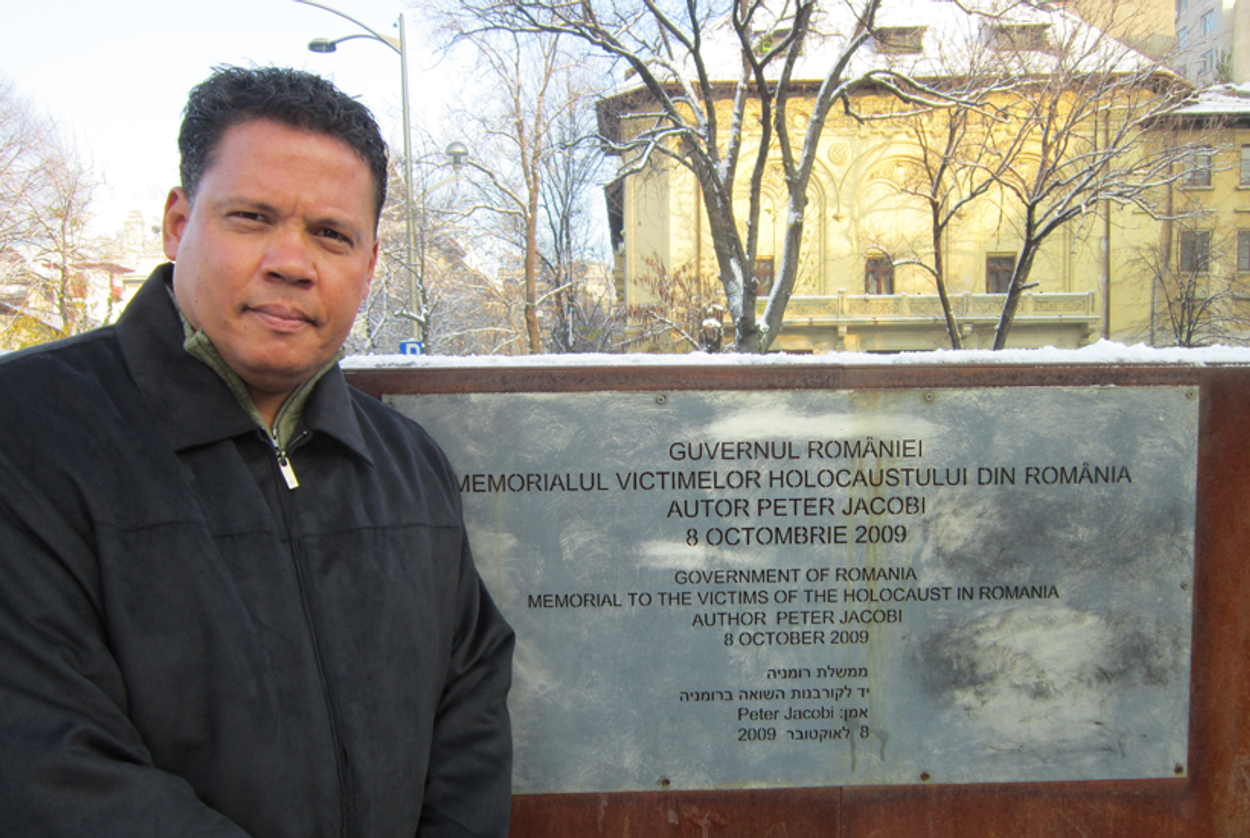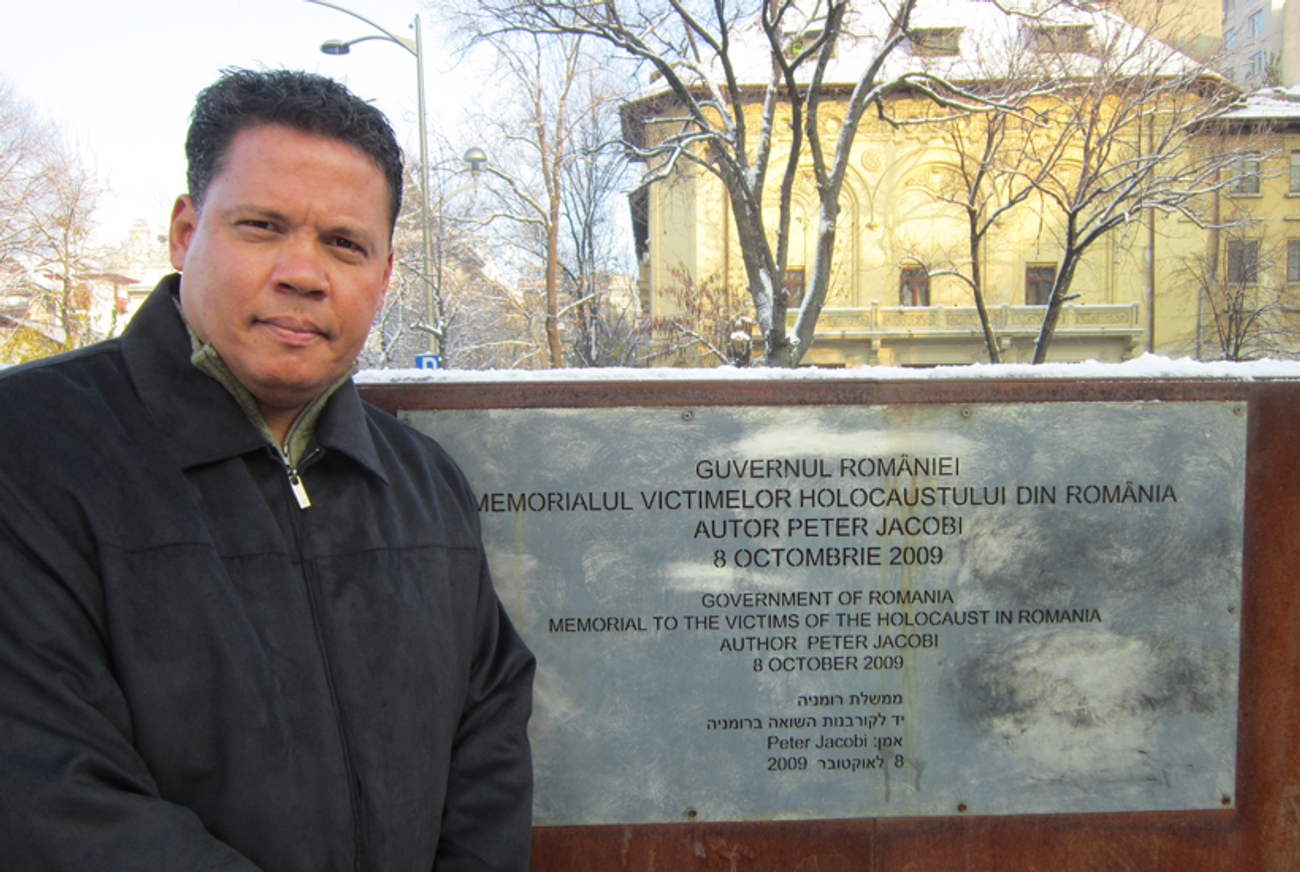Mormon Bishop Is on a Mission To Promote Jewish Missionaries
Interfaith activist Mark Paredes tries to boost understanding between the two religions—and to encourage Jewish proselytizing




Over the past 25 years, Mark Paredes has worked as a national outreach director for the American Jewish Congress, a regional director for the Zionist Organization of America, an attaché at the Israeli consulate in Los Angeles, and a State Department diplomat at the U.S. Embassy in Tel Aviv. He speaks fluent Hebrew, blogs for the Los Angeles Jewish Journal, and has lectured in synagogues across America. But despite this résumé, Paredes isn’t Jewish. He’s a Mormon bishop.
Between his personal and professional responsibilities, the 46-year-old interfaith activist has arguably done more grassroots work than any other person in America to advance Jewish-Mormon relations. He’s braved Jewish audiences who’ve grilled him on the Church of Jesus Christ of Latter-Day Saints’ discontinued practice of posthumously baptizing Holocaust victims, and he’s patiently explained the intricacies of the different denominations and worldviews of American Jews to members of his own faith community.
Now Paredes’ work connecting the two religions is having its big moment, as Jewish and Mormon leaders have begun deepening ties across a range of issues, from interfaith dialogue to Israel advocacy. Just last month, Elder Todd Christofferson, one of the LDS Church’s 12 apostles, participated in a ceremony honoring British Chief Rabbi Emeritus Jonathan Sacks. Last year, Rodney Standage, president of the Albany, N.Y., stake—which is like a Mormon diocese—spoke at a New York synagogue, following in the footsteps of other Mormon leaders in Los Angeles, where Paredes lives.
As these encounters increase, more Jews are asking questions about Mormons: What can Judaism learn from Mormonism’s success as a proselytizing religion? What do Mormons mean when they say they are the “House of Israel”? And when Jews ask questions about Mormons—and vice versa—Paredes has answers.
***
When Paredes started his career, such engagement was largely unheard of. Born to a white mother and a black father, he grew up in Bay City, Mich., where he was baptized into the Mormon church at age 11. It was there that he first encountered Judaism, thanks to the local rabbi, Dov Edelstein, a Holocaust survivor from Hungary. “He invited us to come in for a tour of the synagogue,” Paredes recalled, “and I had a really special feeling when I went through the synagogue. It was unlike anywhere I had ever been, and that feeling stayed with me for years.” After graduating from Brigham Young University, he joined the Foreign Service and soon requested a transfer to Israel, where he served from 1994 to 1996.
After an abortive stint at law school, Paredes moved to Los Angeles, where he ultimately found work as a press attaché at the Israeli consulate—a biracial Mormon representing the Jewish state. Uniquely ensconced in both the Jewish and LDS communities, he noticed that the two were not talking much to each other. “I basically saw that the Jewish-Mormon field was quite ready to harvest and didn’t see anyone else doing it,” he told me, “and so I just decided to strike out on my own.”
Soon, Paredes was chairing his church’s new Jewish outreach committee, running interfaith receptions at the Israeli consulate, and working to spark a conversation that bridged his two worlds. He began writing regularly for the Mormon and Jewish media on LDS-Jewish issues, using his diplomatic skills to advance the cause of interreligious understanding. And between his day-job duties, he started traversing the country, explaining Jews and Mormons to each other at whatever venues would have him, from college campuses to far-flung synagogues. He even met his Romanian wife while delivering a talk on Mormon-Jewish relations at a church in Bucharest.
Paredes is careful to underscore that his work is not missionary work. Sometimes, due to his expertise in Judaism, other Mormons will approach him for advice in educating a Jew who has expressed interest in the LDS Church. He always declines. “I have a personal policy against helping to teach Jewish converts,” he said. “I will go to their baptisms, once they’ve made their decision, but I will not help in teaching them in any way. Given my various positions in the Jewish community, I didn’t feel comfortable doing that.”
Paredes’s desire to foster LDS-Jewish ties seems to arise not from a desire to win converts but from a deep appreciation for and curiosity about the faith, rooted in both theology and sociology. To begin with, unlike many other Christian groups throughout history, Mormons do not believe that God abrogated his covenant with the Jews or replaced them with a non-Jewish “new Israel.” Rather, Mormons consider themselves part of a single Israelite community that also encompasses Jews. As Paredes puts it, LDS theology is “inclusionist,” rather than supercessionist. “From their perspective,” explained Rabbi Noam Marans, director of interreligious and intergroup relations at the American Jewish Committee, “they see their increasing engagement of the Jewish community as a theological reunion with their brothers from whom they’ve been separated.”
Some Mormons and their institutions have even adopted select Jewish practices. Brigham Young University has conducted an annual Passover Seder for four decades, and Sen. Orrin Hatch hangs a mezuzah on the doorpost of his office on Capitol Hill and at his homes in Washington, D.C., and Utah.
Sociologically, Mormons also relate to Jews as a minority faith. Often threatened, expelled, and legislated against in early America, Mormons developed a particular appreciation for the Jewish experience of persecution. And as a small religious population in the United States, with unusual customs that are sometimes misunderstood or even mocked, they share a kinship with the contemporary Jewish community as well. Dan Senor, who served as a senior foreign-policy adviser to Mitt Romney for his presidential campaign, recalled how the LDS politician and his family were incredibly solicitous of his Jewish religious observances, always ensuring he had kosher fare at meetings they hosted. “The desire to be so accommodating and respectful of another minority faith can come from knowing what it feels like to be a minority faith,” Senor said of Romney. (Such sense of solidarity may help explain why Salt Lake City elected its first Jewish mayor in 1932, 42 years before New York City did.)
Romney’s 2012 candidacy raised the profile of Mormons across America, as did the satirical musical The Book of Mormon, feeding into an upswing in interfaith awareness and engagement. “Mormons have become more important in American society, and so in many ways American Jews have taken more notice of Mormons,” said Jason Olson, an LDS scholar at Brandeis University. In the past, he noted, Jews and Mormons were largely geographically isolated from one another, and as a consequence most interfaith dialogue took place between Jews and liberal Protestants and Catholics, and principally on the East Coast. But with the growth of Jewish and Mormon communities in places like Los Angeles over the past decade, that has begun to change—with activists like Paredes at the forefront.
The developing relationship has not been without its hiccups. In the 1980s, the LDS Church sought to construct a Jerusalem branch for BYU, raising Israeli fears of proselytization. The initial backlash was fierce and even inspired an anti-Mormon, yeshivish pop song, “Jerusalem Is Not For Sale” (sample lyric: “You better run for your life/ Back to Utah overnight”). Some years later, controversy erupted back in the States when it was discovered that Holocaust victims had been added to the rolls of individuals being posthumously baptized by the LDS Church. But in both of these cases, the church successfully negotiated a solution with Jewish leaders, deepening rather than attenuating interfaith ties. “Sometimes, it is crisis and the proper navigation of the crisis that increases or betters a relationship,” said Marans, of the American Jewish Committee.
Thus, after assurances were given circumscribing missionary activity, the BYU-Jerusalem campus opened in 1988. And today Jews and Mormons have reached a détente of sorts on the question of posthumous baptism. On the one hand, “the church has committed publicly to doing everything within its power to prevent posthumous baptism of Holocaust victims and other famous Jews,” said Marans. “We have met personally with those who are responsible for preventing these questionable posthumous baptisms, and they are credible people who are committed to doing what they can. Will there be embarrassments from time to time? It is possible, but it is not due to lack of effort on the part of the church leadership.”
At the same time, if a Jew or anyone else with ancestors who perished in the Holocaust converts to the LDS Church, they continue to baptize those forebears. Paredes likes to explain the necessity of this act with an interfaith metaphor: “Asking a Mormon not to baptize their ancestors would be like asking a Jew not to circumcise their sons.” Like brit milah for Jews, in other words, baptizing one’s ancestors is a foundational component of membership in the LDS Church. “We believe that heaven is composed of families that are linked together through the eternities, and that if you break that link, you’re asking a Mormon not to link himself to his ancestors,” said Paredes. “It’s just something that’s unthinkable, really, for a believing Mormon.” This explanation is typical of Paredes’ ecumenical approach, which employs the language of one faith to speak effectively to the other.
***
Paredes’ most provocative attempt to reach across religious lines is his long-running campaign to convince Jews to begin actively proselytizing, much as Mormons do by sending their youth on missions around the world. “I’m a very active missionary for the idea that Jews should be missionaries,” he said. He maintains that doing so would solve a key problem that preoccupies today’s Jewish leadership: the attrition of the younger generation. For one thing, missionary work would help replenish the ranks. For another, the very act of training the youth to spread their faith and values would have the effect of strengthening their connection to Judaism, just as serving on multiyear missions solidifies the commitment of young Mormons. “It works for us, and there’s no reason it can’t work for Judaism,” he said.
For some time, Paredes’ call for an army of Jewish missionaries appeared to be somewhat quixotic. But in recent days, it has gotten an unexpected boost from prominent voices in the Jewish community, from celebrity Rabbi Shmuley Boteach to The Forward editorial board, which called for pursuing more converts to Judaism and drew explicit inspiration from Mormonism. “Standing up for Jewish tradition in public space—actively inviting people to consider becoming Jewish—would be a blessing to the many non-Jews who are interested in becoming Jewish,” Nigel Savage, the president of the Jewish nonprofit Hazon, wrote earlier this month. “It would also be the clearest possible signal to our own young people that we are proud of being Jewish.”
For his part, Paredes hopes that such proposals are put into practice. After all, he said, “I think it would be a great thing if there were more Jews in the world.”
***
Like this article? Sign up for our Daily Digest to get Tablet Magazine’s new content in your inbox each morning.
Yair Rosenberg is a senior writer at Tablet. Subscribe to his newsletter, and follow him on Twitter and Facebook.
Yair Rosenberg is a senior writer at Tablet. Subscribe to his newsletter, listen to his music, and follow him on Twitter and Facebook.